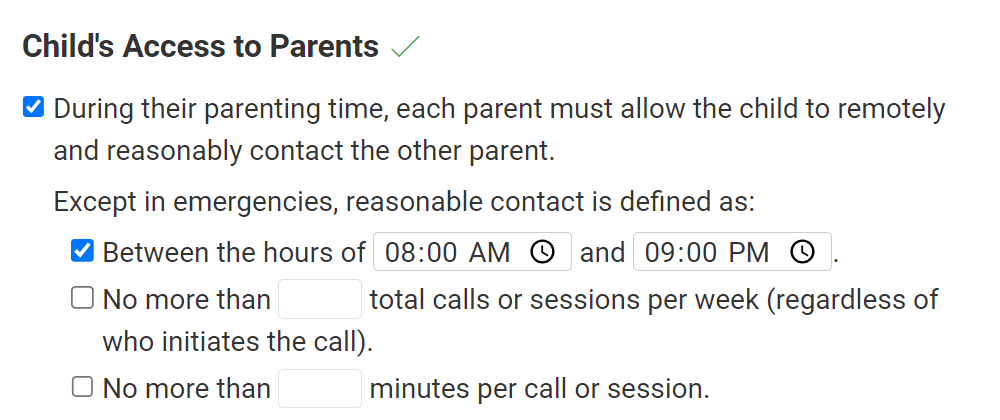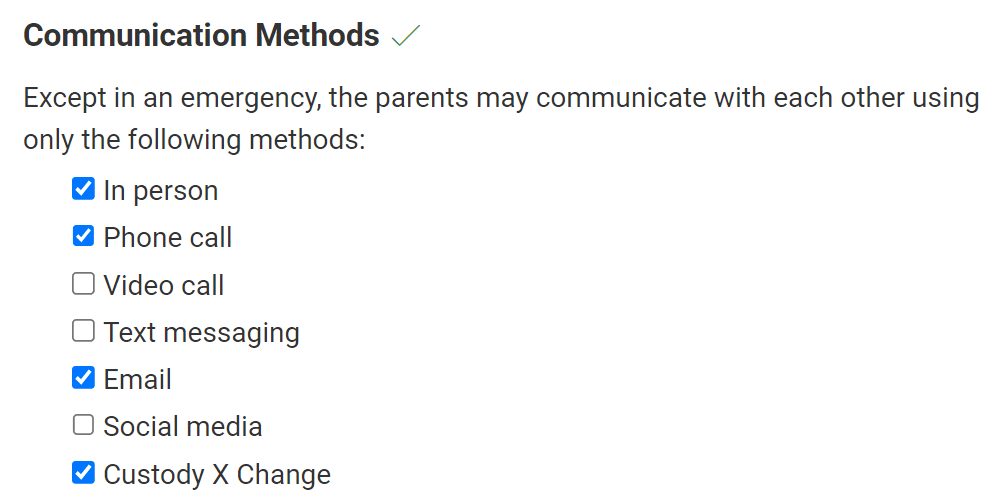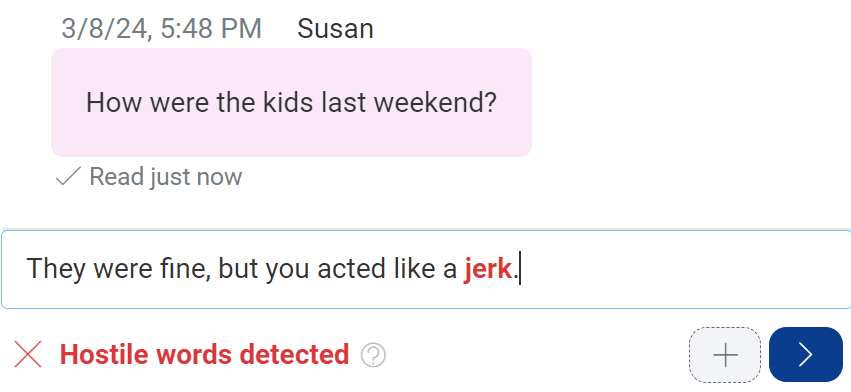What Is Reasonable Phone Contact by a Noncustodial Parent?
Co-parents need to stay in touch with each other and with their child.
If you exchange your child frequently, you'll most likely text or call your co-parent to discuss your child's homework, hobbies, friendships, extended family visits, health status and diet.
On the other hand, if only one of you handles most day-to-day care while the other goes for long periods without seeing your child, parents may not need to share as many details. While the child is with the custodial parent, the noncustodial parent can speak to the child by phone to maintain their personal connection. This is sometimes called virtual visitation.
Stay flexible and responsive
What makes phone contact "reasonable" is specific to your situations and relationships. It isn't just about what you want or what the other parent wants. The goal of the phone contact is to benefit your child.
Unnecessary calls may interfere with everyone's tranquility and privacy. Some separated parents get back together, but if that's not going to be your path, you may want to talk to your ex as little as possible. They may feel similarly about you.
That said, many co-parent relationships do become more amicable over time, or you may go through short periods (like holidays) when you have to at least pretend to get along.
Your child will have their own feelings about speaking to each parent. They may experience something new (like an illness) and need to hear from you more or less during that time. Pay attention to emotional cues and to the value your child is getting from the calls.
Because situations change and you can't always plan your responses, parents should give each other some flexibility regarding how often they can call.
How often should a noncustodial parent call?
While a child is with their custodial parent, the noncustodial parent may want to call to hear their child's voice. They may also want to see their child's face on a video call. These can be meaningful ways to keep in touch.
If the main reason they don't have custody is just that they live far away or are busy with work, the child (and the custodial parent) may appreciate them calling whenever they can.
There's no need to force a conversation to make the phone call fit a certain length. It's more important that the calls be frequent. The noncustodial parent and child might speak every day by phone. If a call isn't answered, the noncustodial parent might assume the child is unavailable to talk; if the child doesn't return the call, the noncustodial parent could try again the next day.
But if the noncustodial parent hasn't been involved in the child's life for years, the child may be confused when they call. Increasing contact gradually may help build trust. If a parent has been abusive, the court may not allow them to increase their contact.
How often should a custodial parent call?
Some custodial parents may have a hard time letting go when their child goes to spend time with the noncustodial parent. The custodial parent has the right to make major parenting decisions if they have sole legal custody, and they'll care for their child most days if they have sole physical custody. The parent gets used to this level of involvement and close attention. When their child goes away for a few days, they may want to call them.
For a child who's very young and getting used to a new exchange routine, the custodial parent may want to call frequently in hopes of reducing the child's anxiety. Maybe the parent will say "goodnight" over the telephone to help the child fall asleep in a new house.
It can be reasonable to check in directly with the noncustodial parent too.
However, the custodial parent should beware of micromanaging the noncustodial parent–child relationship. Just because you're the custodial parent doesn't mean you can run every detail of the other parent's life. That attitude may come across as toxic, controlling or just plain difficult. Generally, when the other parent has parenting time, you should give them an opportunity to show that they're responsible and enjoy their time with their child.
Even if the other parent is letting you down, don't harass them. For example, if they truly can't afford to pay child support right now, calling them repeatedly won't improve the situation. Address a problem constructively rather than simply complaining.
How often should the child call?
As your child grows, they'll gain the ability to reach out to each parent. Every child is different, and parents make rules to fit them.
For example: A 4-year-old needs their parents to call them, an 8-year-old might ask to borrow a phone to start a call, a 12-year-old might be allowed to use their own mobile phone every afternoon, and a 16-year-old might keep their phone by their bedside.
Encourage your child to stay in touch with their other parent. Hopefully, their other parent will similarly encourage them to maintain their relationship with you. However, if you force them to place a phone call, they may come to resent these calls.
You might state in your parenting plan that you'll both allow your child to initiate phone calls. You can put limits on how long these calls last, how often they can be placed, and the hours of the day at which they can happen. This kind of structure can eliminate the distractions of excessive calls and the pressure to make them.
What you should say in your parenting plan
When you propose a parenting plan, think about what you most appreciate about the other parent's communication style and what you wish would change. Try to imagine how the other parent perceives your communications too, and which behaviors and attitudes you'd be open to change.
Does the other parent say you're calling too often — or not often enough? Try establishing an expectation: e.g., you'll call at least once a week, but not more than twice on the same day. Set a rule and stick to it.

You can customize this to fit your situation with Custody X Change.
Does the other parent feel you're more interested in speaking to them than to their child? Breakups are messy, and it's common for parents to retain some feelings for each other. However, if you're still in love but the other parent isn't, you'll have to find a way to accept their feelings and their choice not to be with you. Only then can you move forward in a productive, respectful co-parenting arrangement. You might agree, for example, to stay out of each other's social media.

You can customize this to fit your situation with Custody X Change.
Does the other parent worry you're trying to monitor their parenting or their personal life? It's natural to be curious, but that doesn't mean it's polite to ask or try to find out what's going on. If the other parent doesn't want to tell you very much about their life, respect their boundaries and maintain the requested distance. Don't use your child as a messenger (this is unfair to your child) and don't record anyone without their consent (in some places, it's illegal).

You can customize this to fit your situation with Custody X Change.
Identify your needs
Recognize that you and your co-parent each have needs, and try to balance them:
- You want a meaningful emotional bond with your child.
- Your child has feelings and expectations regarding their phone calls with both parents.
- You need certain information, like medical and school details, so you can support your child.
- Now and then, you'll have to make minor adjustments to your parenting schedule that you must communicate ahead of time.
Plan for respectful phone calls. Avoid calling:
- From a noisy place like a restaurant
- From a place that's distracting for you (like while you're driving in traffic) or for your child (like at a sports game)
- From a place that doesn't have sound privacy (i.e., when other people are present)
- When your child is exhausted or upset
- When you're exhausted or upset
Commit to your ongoing communication
Phrase your parenting plan to say what you and the other parent each must do. The family court can hold the two of you to account. For example, you can say you'll both encourage your child to follow your rules for phone calls.
If you need professional help negotiating a specific issue, consider an alternative dispute resolution method. This can be a good approach if the other parent blocks your calls (or you could go to court).
Even if you haven't received a custody order from a court, follow any communication rules you set together with your co-parent.
If you do have a court order, you and your co-parent are legally required to follow it in its entirety, including anything it says about how you must communicate. The court can enforce its order.
Stay honest with your co-parent. Doing so models good behavior for your child. Also, if you end up back in court, the judge will see who's been telling the truth.
If phone calls feel uncomfortable, you might try text messaging your co-parent. Custody X Change has a hostility monitor to encourage you to write respectfully.

You can customize this to fit your situation with Custody X Change.
A reasonable way to stay in touch
Communicating with your co-parent can be stressful. Use the Custody X Change app to write a parenting plan, schedule your visits and message each other on an ongoing basis. The app's features can help you:
- Create a detailed parenting plan that spells out how you'll parent, and print it for negotiations.
- Design a schedule for the time you expect to have. You each get notified of changes the other makes, cutting down on phone calls.
- Message the other parent for the sake of your child.
Custody X Change makes it easier to communicate with your co-parent.
